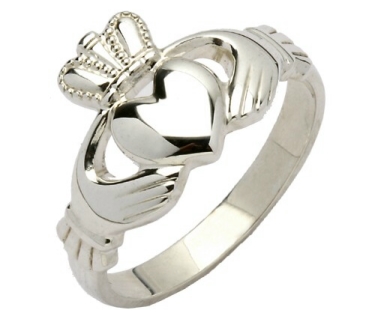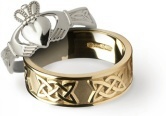Blog Categories
Blog CategoriesA Galway Tale - Claddagh - Where It All Began
The Claddagh ring is one of the most evocative symbols of Ireland. We look at the place and beautiful county of Galway where it all began.
Claddagh is one of the oldest fishing villages in Ireland, on the outskirts of Galway, an area of the western shoreline in the estuary of the River Corrib. Claddagh has a rich history and is said to have existed as far back as the Fifth Century.
 |
| Claddagh Village |
The name Claddagh comes from the Irish word Cladach, meaning ‘stony beach’. As the story goes, the tight knit community of fishermen living in the village of Claddagh did not trust any outsiders. They kept to themselves, living separately from the City of Galway across the river, which had been founded as a medieval city by the Anglo-Normans.
They fished the fish-filled waters of Galway Bay and sold their catch in the fish market. The people of Claddagh lived in thatched cottages and elected their own King, who ruled the community according to ancient rules and customs. The area had its own customs and laws.
The Irish language survived until the 20th century in Claddagh and women in the village also continued to wear their traditional Galway shawls, well in to the last century.
The King of the Claddagh sailed a special boat called a hooker, which had a special white sail. The fishermen, who were known as the Fisher Kings, marked their ships and sails with the crest of the Claddagh which was a warning to outsiders to stay away from their fishing grounds.
The Piscatorial School was founded on Claddagh Quay by the Dominican Fathers back in 1846 to help educate the local children. In the 1990’s the area was a very busy village of thatched cottages and had a large fleet of hookers. However, the situation changed when the big trawlers started to fish in Galway Bay and they could no longer compete. By 1927 it was decided that the cottages were unsafe to live in and by the late 1930’s all the cottages had been knocked down.
This area, which was just outside the city walls of Galway and across the river from the Spanish Arch has utterly changed but the story of the Claddagh - which originated in this fishing village - lives on around the world, lending its name to the Claddagh ring.
 |
| Traditional Silver Claddagh Ring |
